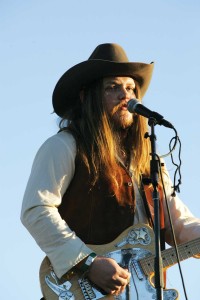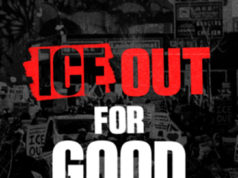Anderson and Matsler write the fundaments and lyrics of every Quaker City Night Hawks song usually separately. For Matsler, there’s a direct link from The Black Bonnets and his solo work (he put out an album on his own in 2010) to the Quaker City sound.
“There are only a few tenets in the Quaker City religion,” Anderson said. “Get people’s attention, get them moving, and everyone [in the band] has to sing.”
Quaker City’s first gig was October 2009 at The Moon. The band’s first rehearsal was a few hours earlier that day.
“I’m sure [the show] probably sounded like a bunch of racket,” Anderson said.

Adams, however, remembers the energy: “And that’s when I knew it was going to be a good project. I mean, I knew all the guys. I liked all the guys. That part was easy. You never really know what’s going to happen until you get onstage, but it was not bad at all. … I’m sure that if we were able to go back and listen to that, it would be punk rock as fuck.”
Moon owner Maunder saw the talent and drive from the get-go. “They always put on a bangin’ show,” he said.
After that, the band entered a phase that continues to this day, describable in two words: Play shows. And play. And play. Spencer’s Corner, a since-shuttered sports bar festooned with ’80s-eras photographs of bikini contests, was where Quaker City Night Hawks perfected their sound and their show. They often played for three or four hours at a time. “We got pretty good at knowing how many beers we could have and still play,” Anderson said.
Matsler described the crowd as “wild,” meaning it was made up of strangers, not the Night Hawks’ friends or fellow musicians. “It gave us time to develop the craft of steering a show in front of a varied audience,” he said. (The guys’ payment was a combined $100 credit at the bar. “But in Spencer’s Bucks, that was like $400!” Anderson joked.)
The Moon was not only the Night Hawks’ birthplace but also the beginning of their recording career. After a Moon show one night, the sound guy, Zaq Bell, offered to record them at his home studio in North Fort Worth. The only recording Quaker City had done before that was a demo from a microscopic rehearsal space behind The Where House on the Near Southside. Putting out a proper recording was always part of the plan, Adams said.
The band went into Bell’s Fusion Project Studios near the end of 2009 and came out with ¡Torquila Torquila! Co-produced by 2014 Grammy winner Jordan Richardson, a.k.a. Son of Stan, and Danny Kalb (Beck, Ben Harper, Taj Mahal), the album is 10 tracks of sometimes blistering, sometimes slow-burning juiciness. “Like Old Cain,” “Bible Black Lincoln,” and “Crack at the Bottle” are still crowd favorites.
Adams said the album is a great snapshot of the band then: “It’s exactly what we sounded like at that time. With some good reverb on it.”
Recording ¡Torquila Torquila! also helped set Anderson’s mind at ease a bit: “I was comfortable knowing we could go into a studio, and no one had any hang-ups, no one doing 30 takes on one song because they couldn’t get into the right head space. Everything worked naturally. … That was very uplifting.”
He also remembered thinking, “When we do this next time, at least I know we aren’t going to end up killing each other.”
Throughout the recording process, the band kept gigging. Gigs, then and now, are sometimes rehearsals for Quaker City. “We’ve played so many shows in so many places, we’re not afraid of taking that risk and messing up,” Matsler said. “We can rehearse the basic building blocks of a song and feel confident to just go out there and do it, and that comes from hundreds of hours of playing together. We know where it’s gonna go, what everybody’s capable of, and just go with it.”
Mabe said that he and his bandmates can read one another musically very well. Most of the time. “Fuck-ups are part of it,” he said. “We’re all really good at covering our mistakes, and that’s an art in and of itself.”
Adams doesn’t foresee any major changes in the Night Hawks ethos: “It’s been this way since Day 1, so why would we do it any differently?”
Of course no one outside of the band would be able to tell if the Night Hawks had fucked up onstage or not. Though their music isn’t math-y or orchestral or otherwise demanding unfailing precision and technical focus, it is a style in which every note counts, constantly feeding into the particular mood or vibe that the band is going for.
The Quaker City Night Hawks sound could be described as deceptively complex. Except for a few head-banging moments, when all the musicians are pounding on the same couple of chords and beats in unison, the music is like clockwork, in which melodies and rhythms complement rather than merely augment one another. Maybe the guitar is going in one direction while the vocal melody is going in another and the rhythm in yet another. It might sound terrifically proggy on paper, but a Night Hawks song –– no matter how many detours it may take –– is always tightly focused and easy to follow. And often just as easy to dance to.
Fort Worth singer-songwriter and former Neon Indian guitarist Ronnie Heart has been a huge fan since the early days.
“Quaker City Night Hawks incorporate several styles of music within a single song or set,” he said. “The way they mix these styles feels honest and not forced. Every band member has something interesting going on, and when combined, it turns into a push and pull between energetic rhythm and laid-back groove. It’s a feat to not feel compelled to dance.”
Mabe’s drumming is particularly inventive and musical. You could strip away everything but his skins and know the exact Night Hawks song he’s playing based on the beats. “It’s the most ‘me’ drumming I’ve ever done,” he said. “For the first time I wasn’t being compared to some other drummer.”
Anderson said everyone in the band is big on musical exploration “That’s what’s fun about this band too. Everyone lets everyone be the kind of musician he is.”
The Night Hawks’ tightness makes their specific brand of unhyphenated rock look easy. “I’ve heard from a few people that we’re one of the smiling-est bands onstage, which I think is cool,” Mabe said. “We’re just having fun, and you’re allowed to smile every once in a while.”
The guy who gave the Night Hawks their first gig couldn’t be prouder. “It’s been amazing watching these guys grow from 21-year-old hopefuls into the men and the band they are today,” Maunder said. “They are students of their craft and slaves to their passion, and it just keeps paying off for them.”
After ¡Torquila Torquila! came out in 2011, the band played a few regional dates but never really strayed from home turf. And this is when words like “over-saturate” and “market” began to get thrown around. “I think that’s a total bullshit thing to say,” Mabe said.
Working to the band’s advantage, Adams said, is the fact that the Fort Worth scene tends to be compartmentalized, with people mostly staying close to their own neighborhoods for concerts. “People north of [I-30] don’t go south of 30 to see shows” and vice-versa, he said, “so we could play for different people in all these little different areas of Fort Worth and Dallas, for that matter, so … I think it’s a total cop-out to say you can over-saturate [the market], because you can’t. We tried as hard as any band could try, and we didn’t do it.”
Keys Lounge, where the Night Hawks have played more than a few shows over the years, “might as well be in a different city if you live [near] West 7th,” Anderson said.
The market-saturation question is irrelevant now. Quaker City Night Hawks are no longer a purely local entity.
********











